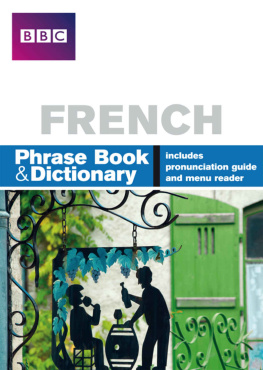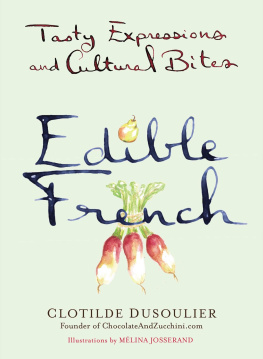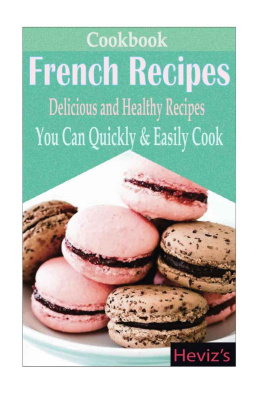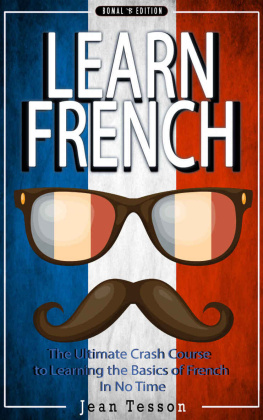Victoria Mas - The Farm to Table French Phrasebook: Master the Culture, Language and Savoir Faire of French Cuisine
Here you can read online Victoria Mas - The Farm to Table French Phrasebook: Master the Culture, Language and Savoir Faire of French Cuisine full text of the book (entire story) in english for free. Download pdf and epub, get meaning, cover and reviews about this ebook. year: 2014, publisher: Ulysses Press, genre: Home and family. Description of the work, (preface) as well as reviews are available. Best literature library LitArk.com created for fans of good reading and offers a wide selection of genres:
Romance novel
Science fiction
Adventure
Detective
Science
History
Home and family
Prose
Art
Politics
Computer
Non-fiction
Religion
Business
Children
Humor
Choose a favorite category and find really read worthwhile books. Enjoy immersion in the world of imagination, feel the emotions of the characters or learn something new for yourself, make an fascinating discovery.

- Book:The Farm to Table French Phrasebook: Master the Culture, Language and Savoir Faire of French Cuisine
- Author:
- Publisher:Ulysses Press
- Genre:
- Year:2014
- Rating:3 / 5
- Favourites:Add to favourites
- Your mark:
The Farm to Table French Phrasebook: Master the Culture, Language and Savoir Faire of French Cuisine: summary, description and annotation
We offer to read an annotation, description, summary or preface (depends on what the author of the book "The Farm to Table French Phrasebook: Master the Culture, Language and Savoir Faire of French Cuisine" wrote himself). If you haven't found the necessary information about the book — write in the comments, we will try to find it.
Everyone can tell the difference between Brie and Caembert, but few know their Valenay from Plardon. Luckily, The Farm to Table French Phrasebook serves up the vital French expressions other guides leave off the plate. From the specialty vocabulary of chefs in gourmet restaurants to slang terms rarely heard outside a country market, heres everything the reader needs for a gourmet tour of France (or the local bistro!).
A comprehensive language guide for food lovers, this indispensable companion also offers a fascinating history of French eats, complete with delicious facts about the cuisines of every region from Alsaces pinot gris to Normandys Pot-au-feu. This beautifully illustrated book is perfect to take along for a day of sampling gourmet local specialties, or it makes a great present for the Francophile in your life.
The Farm to Table French Phrasebook opens a bountiful world of food that you wont find in any textbook or classroom:
Navigate produce markets, charcuteries and patisseries
Prepare meals the French way with delicious, authentic recipes
Speak the lingo of Pariss top restaurants and bistros
Pair regional wines with delightful cheeses
Master the proper table etiquette for dining at a friends house
Victoria Mas: author's other books
Who wrote The Farm to Table French Phrasebook: Master the Culture, Language and Savoir Faire of French Cuisine? Find out the surname, the name of the author of the book and a list of all author's works by series.











 Text copyright 2014 Victoria Mas. Illustrations copyright Meera Lee Patel. Design and concept copyright 2014 Ulysses Press and its licensors. All rights reserved. Any unauthorized duplication in whole or in part or dissemination of this edition by any means (including but not limited to photocopying, electronic devices, digital versions, and the Internet) will be prosecuted to the fullest extent of the law. Published by Ulysses Press P.O.
Text copyright 2014 Victoria Mas. Illustrations copyright Meera Lee Patel. Design and concept copyright 2014 Ulysses Press and its licensors. All rights reserved. Any unauthorized duplication in whole or in part or dissemination of this edition by any means (including but not limited to photocopying, electronic devices, digital versions, and the Internet) will be prosecuted to the fullest extent of the law. Published by Ulysses Press P.O. You may not have set foot in France (yet), but youre probably already familiar with such words as baguette, pain au chocolat, or ratatouille. Perhaps youve sunk your teeth into a fresh croissant from your local French bakery and marveled at its perfect texturea delicate, flaky crust with a soft, fluffy inside. Or maybe you experimented with a batch of macarons just to see what the rage was about, and since then your approach to pastries has never been the same.
You may not have set foot in France (yet), but youre probably already familiar with such words as baguette, pain au chocolat, or ratatouille. Perhaps youve sunk your teeth into a fresh croissant from your local French bakery and marveled at its perfect texturea delicate, flaky crust with a soft, fluffy inside. Or maybe you experimented with a batch of macarons just to see what the rage was about, and since then your approach to pastries has never been the same.